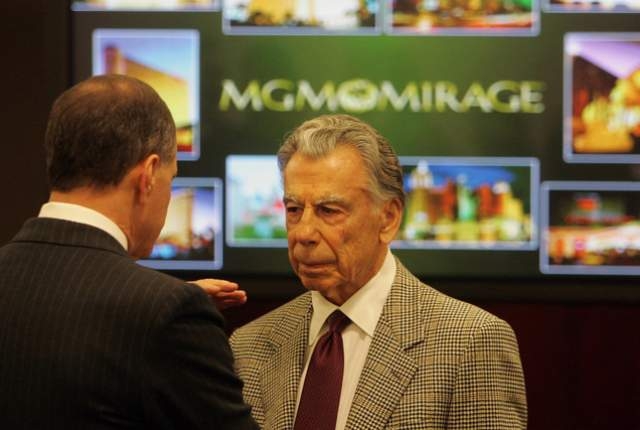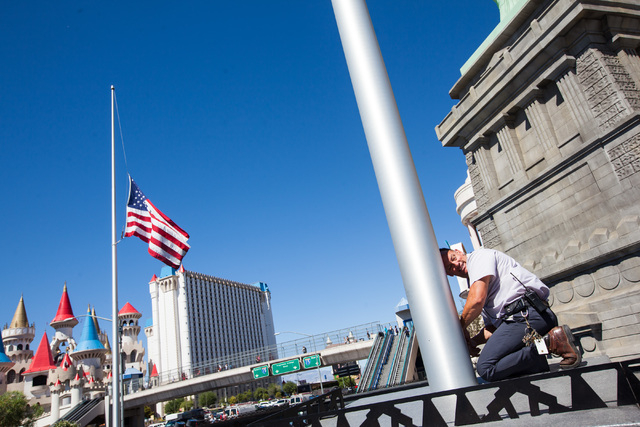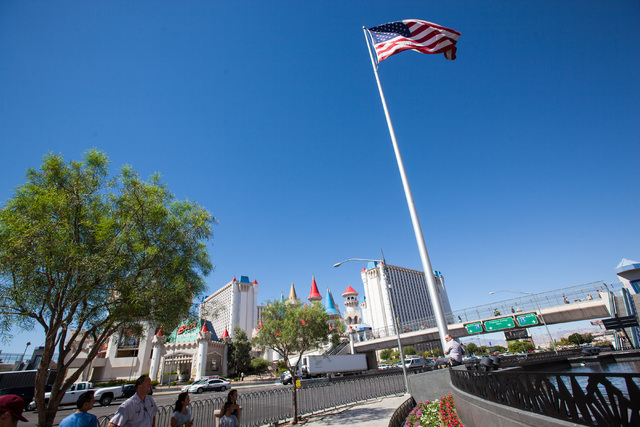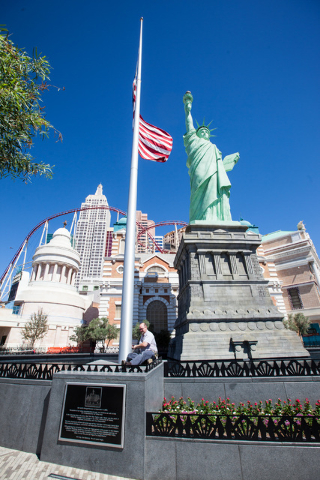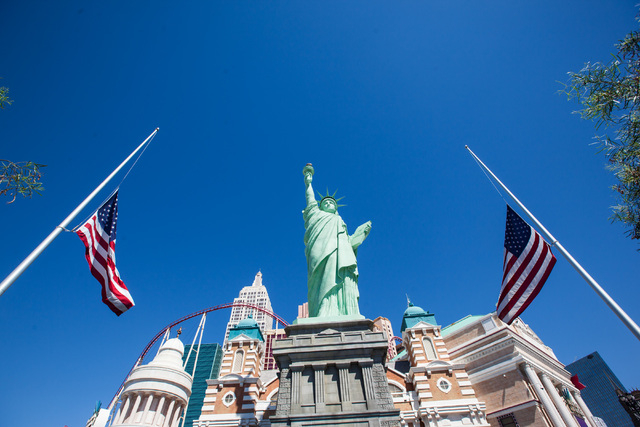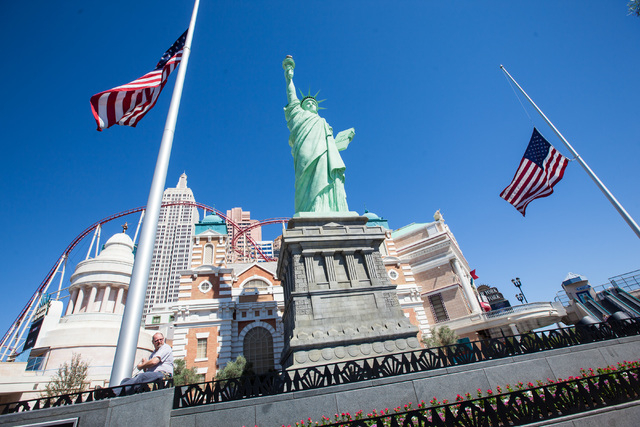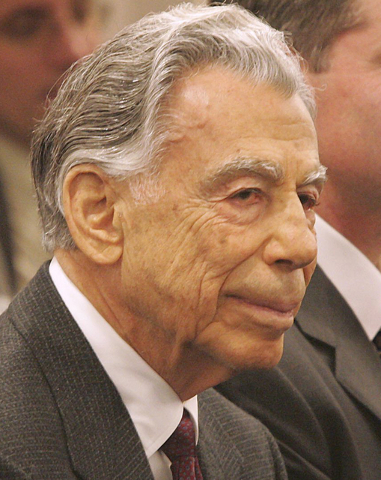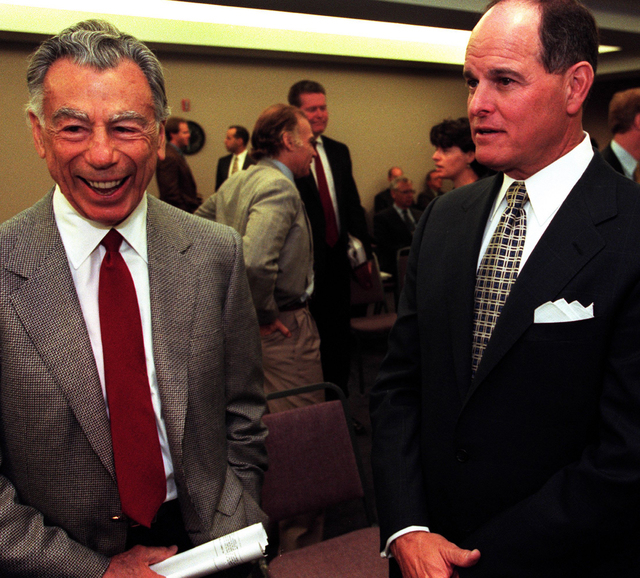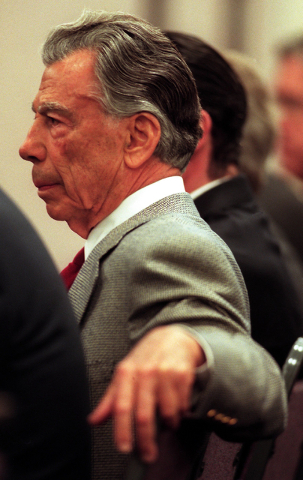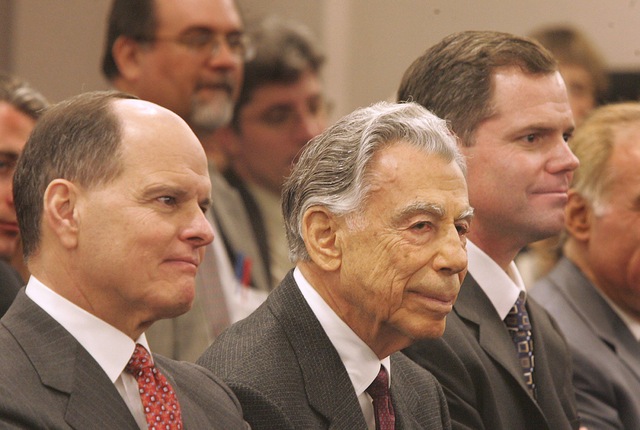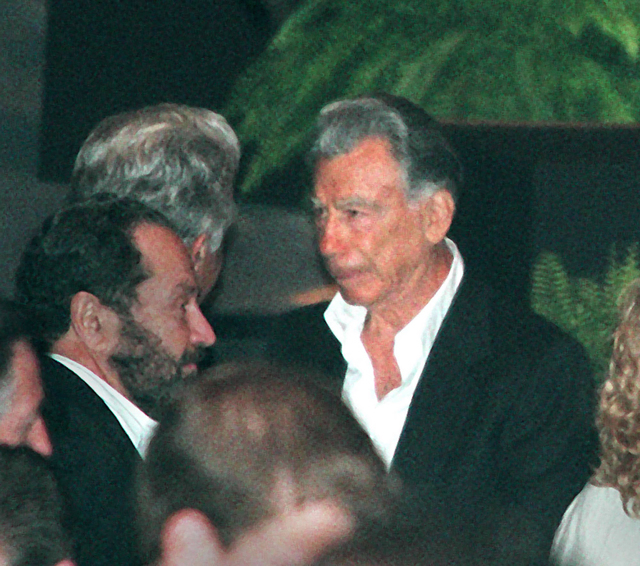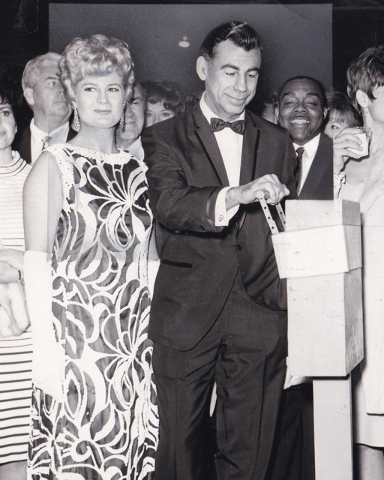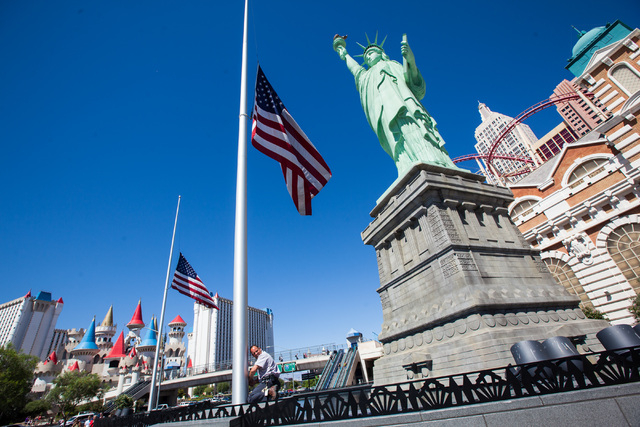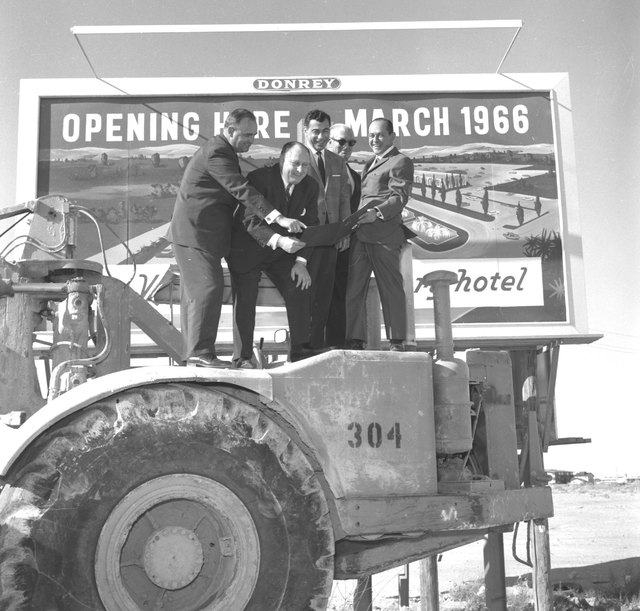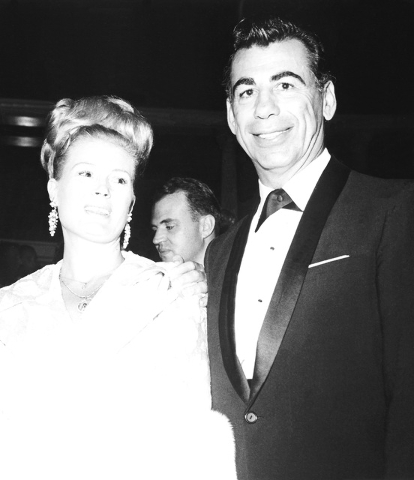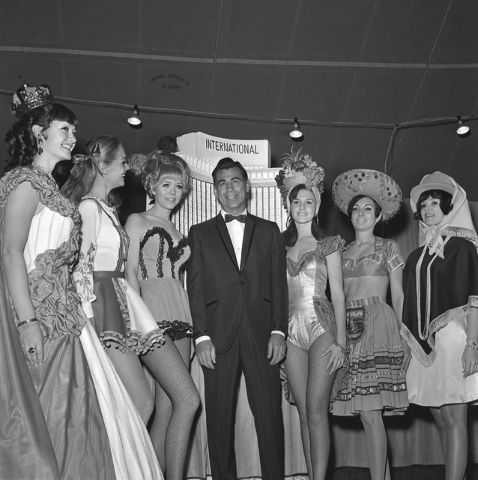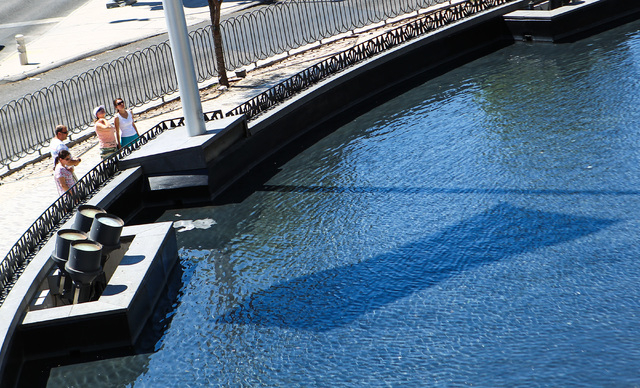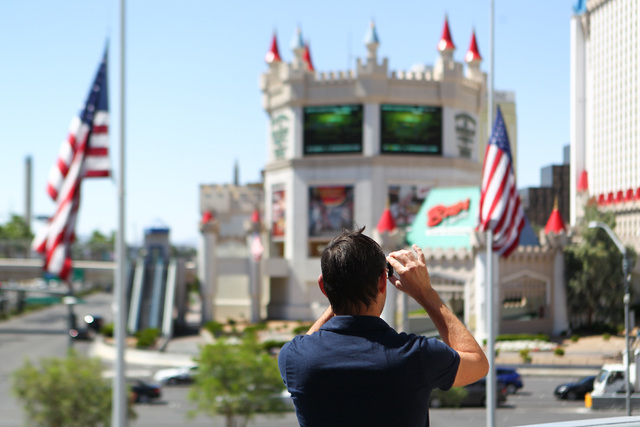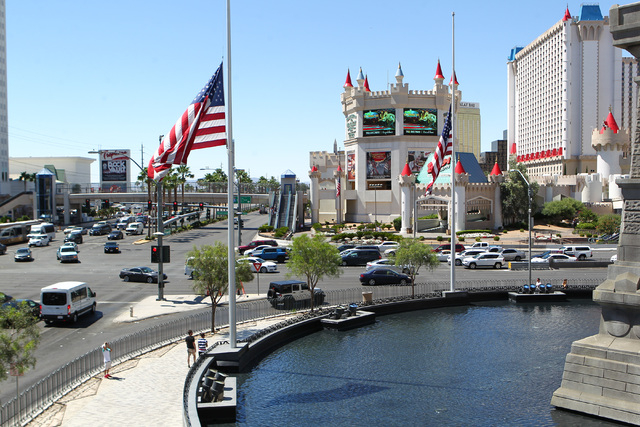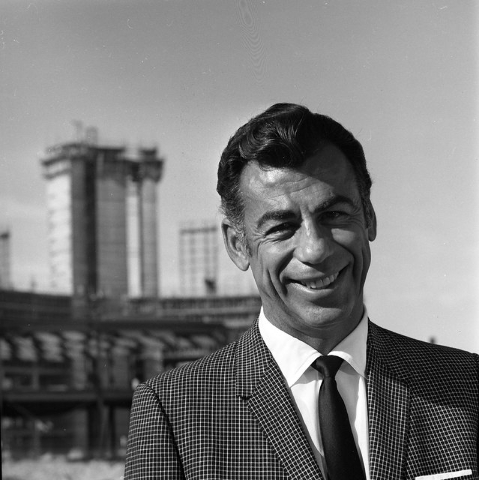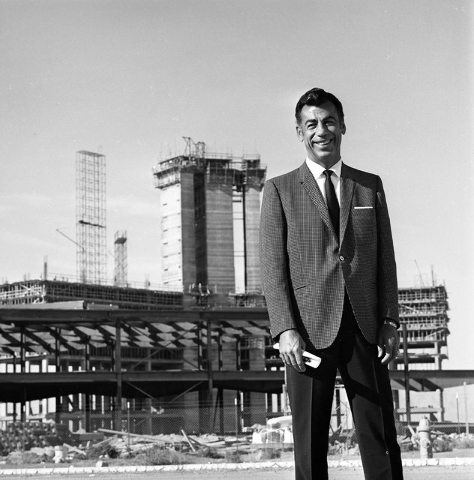Billionaire Las Vegas mogul Kirk Kerkorian dies in Los Angeles
Billionaire financier Kirk Kerkorian, one of the founders of modern Las Vegas, whose name is synonymous with some of the Strip’s best-known hotel-casinos, died Monday night in Los Angeles after a brief illness.
Kerkorian, who turned 98 on June 6, was the largest shareholder in MGM Resorts International, which he founded in the early 1990s.
Considered one of the central figures in making Las Vegas a premier global tourist destination, Kerkorian three times built and opened what were then the world’s largest hotel-casinos — the International (now the Westgate Las Vegas) in 1969, the original MGM Grand (now Bally’s) in 1973 and the current MGM Grand in 1993.
Kerkorian invested in and operated businesses in numerous industries, including airlines, automakers and film studios, but no business held his interest as much as gaming. He owned, operated and sold a handful of historic Strip resorts, playing a paramount role in shaping the landscape of the Strip and Las Vegas.
Much of what Kerkorian accomplished was without fanfare.
When the $8.5 billion CityCenter development opened in 2009, Kerkorian, who had a key role in getting the development off the ground, celebrated the event quietly, away from the spotlight.
“Of all the wonderful Las Vegas properties with which I’ve been associated, CityCenter is simply the most amazing,” Kerkorian said in prepared remarks. “I’m extremely excited to see the public’s reaction and look forward to seeing how it changes Las Vegas.”
His friends and colleagues in and out of the gaming industry recalled Kerkorian as a quiet and humble pioneer.
MGM Resorts Chairman Jim Murren said Tuesday that the company was “honoring the memory of a great man” and that he has lost a good friend.
“Mr. Kerkorian combined brilliant business insight with steadfast integrity to become one of the most reputable and influential financiers of our time,” Murren said. “Personally, he was a friend and coach who taught me the importance in looking forward and to look back only to understand how things could be done better.”
Sen. Harry Reid of Nevada, who became acquainted with Kerkorian as an attorney representing the businessman’s brother in the 1960s and 1970s, took to the Senate floor Tuesday morning to discuss Kerkorian.
“He was just a really interesting, wonderful man,” Reid said. “He is one of the personalities I will never forget. My relationship with him is one of the special things in my life. I feel so fortunate to be able to talk on a personal basis about this man. He was one of a kind.”
David Schwartz, director of the Center for Gaming Research at UNLV, said Kerkorian “may have had the biggest impact of any one individual” ever on the Strip. Schwartz said Kerkorian, while creating jobs through his development of Strip resorts, forced “Las Vegas to think big.”
“Today we accept that the city has a good percentage of the world’s biggest hotels and some of its most profitable casinos, restaurants, and nightclubs,” Schwartz said. “Kerkorian was the first one to think of Las Vegas in those terms and to actually deliver. Without him, our city would be much smaller in many ways.”
HUMBLE BEGINNINGS
Born in Fresno, Calif., in 1917 to Armenian immigrants, Kerkorian never had it easy. After the Kerkorians lost their farm in 1922, the family moved to Los Angeles, where at age 9, he sold newspapers on street corners.
From those humble beginnings, Kerkorian became one of the world’s richest men. At the time of his death, Forbes Magazine ranked him No. 393 among the world’s billionaires and No. 130 in the United States, with a net worth of $4 billion.
Tracinda Corp., Kerkorian’s privately held investment company named for daughters Tracy Kerkorian and Linda Ross Hilton Kemper, is MGM’s largest shareholder with 91.1 million shares, or a 16.2 percent stake.
In a securities filing Tuesday, Tracinda said the executor of Kerkorian’s estate will “execute an orderly disposition of Tracinda’s position” in MGM. No time frame was given.
Over the years, Kerkorian had reduced his one-time majority stake in the company, and he retired from its board in 2011, becoming a senior adviser to the company and emeritus board member.
“I just didn’t care to keep going back to meetings,” Kerkorian said at the time. “(The board meetings) got to be very lengthy. I do stay busy. I like new challenges.”
But Kerkorian’s presence was still felt in the company. Tracinda’s two representatives on the board in April threw their support behind the company’s management to help end a contentious proxy fight.
Until his illness, Kerkorian spoke weekly with Murren.
“He is very proud that Las Vegas and MGM Resorts is on a global stage,” Murren said in an interview last week.
Kerkorian had a similarly close relationship with the late Terry Lanni, Murren’s predecessor and the company’s chairman and CEO for 14 years.
“Kirk is a very humble person,” Lanni told the Review-Journal in 2007. “I’ve seen a lot of people who own 2 percent of something who call it their company. Never once in my 12 years with Kirk have I heard him refer to MGM Mirage as ‘my company.’ Whenever we propose something, he wants to know how it will affect the other shareholders. He has majority control, but he’s very cognizant of all the other shareholders.”
BUILDING AN EMPIRE
In his youth, he was known as “Rifle Right Kerkorian” for his punching power as a small-time boxer after abandoning reform school in the eighth grade. He had little formal education after that.
A friend with whom he worked installing furnaces changed his life by taking him on a flight in a small plane. Kerkorian then paid for flying lessons with famed pilot Pancho Barnes by milking cows and shoveling manure at her ranch. A skilled aviator, Kerkorian flew dangerous missions delivering warplanes from Canada to Britain during World War II and later opened a charter airline ferrying gamblers from Los Angeles to Las Vegas.
He began buying property in Las Vegas in 1962 after selling his charter airline, which he later repurchased. After selling the land where Caesars Palace now stands, he bought 82 acres on Paradise Road in 1967. The site would eventually be home of the 1,512-room International. Before that resort opened, Kerkorian bought the Flamingo as a way to train the International’s staff.
At the International, Kerkorian brought in Barbra Streisand and Elvis Presley as the hotel’s first two performers.
By the end of 1971, he had sold both properties to Hilton Hotels Corp.
Kerkorian then took majority ownership of MGM Studios, decided to put the studio’s name on a new hotel-casino, the MGM Grand, which opened in 1973 at a cost of $107 million. With 2,084 rooms, the MGM Grand surpassed the International as the world’s largest hotel-casino.
In 1986, he sold the MGM Grand and a sister resort in Reno to Bally Manufacturing of Chicago for $594 million. At the time, gaming analysts said it was the largest single hotel sale ever.
Kerkorian didn’t stay sidelined for long. In 1987, he bought both the Desert Inn and the Sands for $167 million from Summa Corp., the legacy of the Howard Hughes casino empire.
“He went toe-to-toe with Howard Hughes and won,” Schwartz said.
A year later, Kerkorian sold the Sands to then trade-show magnate Sheldon Adelson for $110 million. (The Sands was demolished, making way for The Venetian).
In 1989, while remodeling the Desert Inn, Kerkorian announced he was acquiring the troubled Marina and the adjacent Tropicana Country Club. He said the 115 acres at the corner of Tropicana Boulevard and the Strip would be the site of the $700 million MGM Grand hotel and theme park, which opened in 1993 with 5,000 rooms and became — at the time — the world’s largest and most expensive hotel-casino.
“Kirk Kerkorian was one of the true pioneers of Las Vegas whose vision and drive brought us some of the most iconic properties in our history,” Las Vegas Convention and Visitors Authority CEO Rossi Ralenkotter said. “From the International, complete with Elvis, to the MGM Grand, Mr. Kerkorian was always eyeing bigger and better things for tourism in Las Vegas.”
THE ART OF HIS DEAL
At an age when most of his contemporaries were retired or deceased, Kerkorian was still refining the art of the deal. The word retirement was absent from his vocabulary.
Friends said he had an agile mind and a keen business acumen. He never wavered in the way he negotiated transactions and struck financial agreements. Friends and rivals alike said Kerkorian was like a seer, gazing 10 years to 20 years into the future when viewing how a potential investment opportunity could affect the gaming industry.
On the occasion of Kerkorian’s 90th birthday in 2007, the late Burton Cohen, who knew Kerkorian for more than half a century and operated some of the businessman’s Las Vegas hotel-casinos, said his friend “absolutely loves making the deal. That’s what drives him.”
Kerkorian engineered two buyouts that grew MGM Grand into one the gaming industry’s largest companies.
In 2000 he negotiated the $6.4 billion purchase of Steve Wynn’s Mirage Resorts and in 2005 helped seal the $7.9 billion Mandalay Resort Group acquisition.
“He loves the game, pure and simple, and he knows how to make money for himself and his stockholders,” South Point owner Michael Gaughan said in 2007.
UNLV history professor Michael Green once humorously likened Kerkorian to Zelig and Forrest Gump, fictional literary and cinematic characters who miraculously pop up in many world-changing events. Kerkorian appears to have played a role in many of Las Vegas’ historical moments.
“It seems like he’s been involved in everything that has gone on here,” Green said.
As a businessman, Kerkorian touched industries besides gaming.
He dabbled in airlines, once owning about 17 percent of now defunct Western Airlines in the 1970s. In 1991, he made a failed bid for Trans World Airlines. He also created the short-lived MGM Grand Airlines.
Hollywood also held his interest. Three times Kerkorian bought and sold the film studio MGM/United Artists — making a profit all three times.
The U.S. auto industry also captivated Kerkorian.
In the 1990s, he bought a large chunk of the Chrysler Corp. but sold the stock after launching a failed hostile tender offer.
In 2005 and 2006, Kerkorian made moves on General Motors Corp., becoming the automaker’s largest shareholder before cashing out altogether. In April 2007, Kerkorian made one last stab at Chrysler Corp., offering $4.5 billion. The bid failed.
Gaming, however, remained his passion.
PERSONAL LIFE
Kerkorian was married four times, and his third marriage brought the normally shy businessman tabloid headlines.
He had a decade-long romantic relationship with former tennis player Lisa Bonder, but they were married for only a month in 1999.
In high-profile legal battle in 2002, Bonder demanded $320,000 per month in child support for her then-4-year-old daughter. A judge granted $50,316 per month.
But Bonder later admitted she faked a DNA paternity test by using saliva she obtained from Kerkorian’s adult daughter.
It was later revealed that Hollywood producer Steve Bing was the father after a security guard working for Kerkorian nabbed dental floss from Bing’s trash to obtain a DNA sample.
Meanwhile, Kerkorian’s longtime confidant and attorney, Terry Christensen, paid celebrity private investigator Anthony Pellicano $100,000 to tap Bonder’s phone.
Kerkorian later denied knowledge of the wiretapping, and Christensen was sentenced to three years in federal prison for his role.
Kerkorian was a dedicated philanthropist who quietly donated a fortune to charities worldwide. His charitable work included hundreds of millions of dollars in support of Armenia. He started providing medical and other supplies after a damaging 1988 earthquake in Armenia and helped build homes and repair infrastructure.
In 2011, Kerkorian transferred his $200 million charitable Lincy Foundation to the University of California at Los Angeles. The foundation was established in 1989 and had given more than $1.1 billion to schools, hospitals and Armenian charities.
Kerkorian is survived by his daughters and three grandchildren. Funeral services are pending.
Reuters contributed to this report.
Contact reporter Howard Stutz at hstutz@reviewjournal.com or 702-477-3871. Follow @howardstutz on Twitter.



